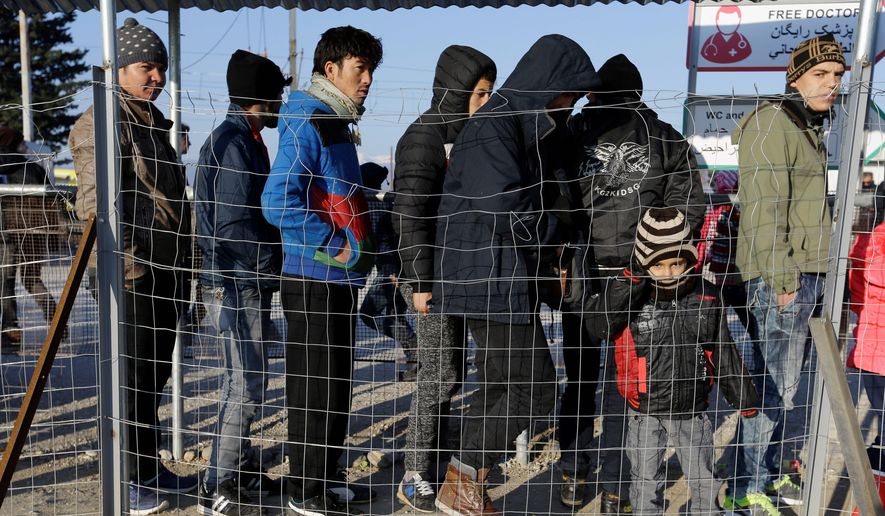The Obama administration isn’t vetting the social media profiles of all Syrian refugees despite promises made last year after the San Bernardino terrorist attack, which exposed holes in the U.S. immigration screening process.
Concerns over refugee screening spurred Kansas Gov. Sam Brownback, a Republican, on Tuesday to cancel his state’s cooperation with federal authorities trying to resettle Syrians.
It was another blow to the administration’s attempts to reach President Obama’s goal of accepting 10,000 Syrians this fiscal year.
With a little more than five months left in the fiscal year, the government is 8,370 refugees short of its goal. Lawmakers on Capitol Hill say they fear the administration will reduce screening even more to speed up the process. To meet the president’s target, immigration officials would have to approve about 75 applications every workday for the rest of the fiscal year — nearly seven times the average so far.
“What is far more important than the arbitrary number of 10,000 is whether these refugees can be properly screened. If the answer is no, which is obviously the case given testimony by the FBI director and homeland security secretary, then we should not let a single one into the country,” said Rep. Vern Buchanan, Florida Republican.
Mr. Buchanan is sponsoring legislation that would force the Homeland Security Department to review social media accounts of anyone seeking entry to the U.S.
His bill has the backing of Rep. Devin Nunes, California Republican and chairman of the House Permanent Select Committee on Intelligence, and Rep. Michael T. McCaul, Texas Republican and chairman of the House Homeland Security Committee.
The social media problem burst into view last year after one of the attackers in the San Bernardino, California, terrorist massacre was found to be an immigrant who had posted online of her desire to wage jihad. It turned out she had posted privately, not publicly, but the administration acknowledged that it should be screening social media messages.
Homeland Security Secretary Jeh Johnson and U.S. Citizenship and Immigration Services Director Leon Rodriguez said in February that the administration was increasing its monitoring, including screening social media accounts of those applying as refugees from Syria.
A USCIS official, who asked not to be identified, confirmed Tuesday that the agency has not reached that point but insisted that other checks are “extraordinarily thorough and comprehensive.”
The official said the agency tries to find refugee applicants who are most likely to be risks and then attempts to scour their online accounts.
“USCIS conducts risk-based screening on publicly available social media postings in connection with applicants for certain immigration benefits, including certain refugee applicants. DHS also continues to run pilot programs and evaluate the results of these efforts to expand the appropriate use of social media as indicated,” the official said.
Last year, before several major attacks raised security questions, Mr. Obama pledged to increase the number of Syrian refugees in the U.S.
But his plans were undercut by his own top national security officials, including the director of the FBI, who said the government lacks the resources on the ground or the access to Syrian databases to vet applicants completely.
Homeland Security officials said they can check their own databases, but critics warn that it’s impossible to know what risks the applicants pose if they cannot verify refugees’ stories in Syria.
Republican governors balked at the president’s plans and vowed to refuse cooperation with federal efforts to resettle Syrians in their states. On Tuesday, Mr. Brownback became the latest to say he would cancel his state’s resettlement agreement.
“As governor, I must have confidence that the refugee relocation program, and particularly the vetting process, is sufficient to protect our citizens. If I have to choose between the safety and security of Kansans and the relocation of refugees, I will take action to protect Kansans,” he said.
He said he met last week with officials from the State and Homeland Security departments and they were unable to convince him that screening was thorough enough to weed out security risks. He said he waited five months for answers and ran out of patience.
Ending state cooperation can hinder federal efforts, but it won’t stop private groups from working with the government to bring refugees to Kansas, said Jennifer Sime, senior vice president of U.S. programs at the International Rescue Committee.
“Gov. Brownback’s decision to end Kansas’ involvement in resettling refugees is completely out of touch with local communities’ overwhelming support and embrace of refugees,” she said. “This is especially disappointing and contradictory given his support of the program during his tenure in the Senate.”
For now, the Obama administration remains committed to its goal of 10,000 Syrian refugees and an overall target of 85,000 refugees from around the globe.
“The U.S. has established several new initiatives to increase processing capacity, including new processing centers, increased staffing, and a new pathway for certain Syrians with relatives in the United States to apply for refugee resettlement,” said Katherine Pfaff, a spokeswoman for the State Department.
The U.S. has taken in more than 3,500 refugees since the beginning of 2010, and the State Department says it’s a “myth” that they pose dangers to the communities where they are resettled. “None have been arrested or removed on terrorism charges,” the department says.
However, a man was charged this year with terrorism-related crimes. The FBI said Aws Mohammed Younis Al-Jayab, a Palestinian born in Iraq who came to the U.S. as a refugee from Syria, lied to immigration agents about his attempts to join terrorists operating in Syria.
The FBI cited evidence it obtained from his social media accounts after using a search warrant. Investigators said Mr. Al-Jayab lied to protect his refugee status.
The Obama administration said Mr. Al-Jayab doesn’t count against the Syrian refugee program because he is considered an Iraqi refugee, even though he was in Syria at the time he was granted refugee status.
• Stephen Dinan can be reached at sdinan@washingtontimes.com.




Please read our comment policy before commenting.